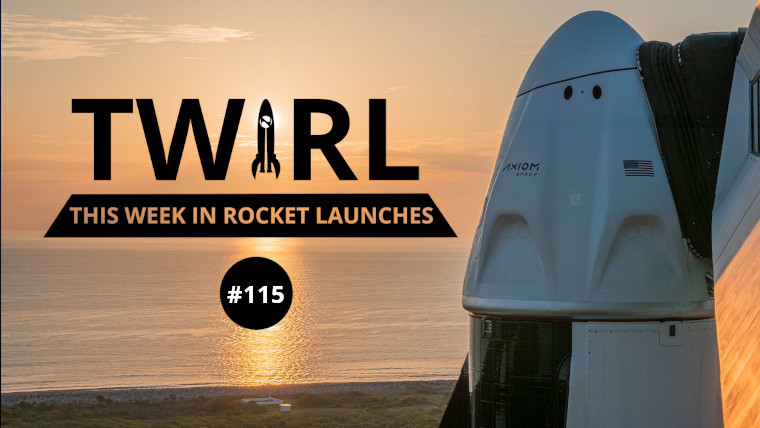
We have a super busy week ahead of us in rocket launches. You can peruse the schedule at your own leisure below but I would recommend taking a look at the Falcon 9 launch on Sunday as it will be a manned mission to the ISS and an interesting one at that.
Sunday, May 21
Kinetica 1
The first launch this week is CAS Space’s Kinetica 1 rocket. This launch was meant to happen last week but got delayed. If the launch goes ahead, it will be the second time the Kinetica 1 rocket has ever flown and will be carrying the Fucheng 1 and Luojia 2-01 satellites to orbit.
The mission is set to take off at 8:40 a.m. UTC from the Jiuquan Satellite Launch Centre. It’s not expected that there will be a stream of the event but we should have footage in next week’s recap.
Falcon 9
Next up, also taking place on Sunday, is the launch of a SpaceX Falcon 9 carrying the Ax-2 Crew Dragon. The company is working with Axiom Space to send several astronauts to the International Space Station for a week.
The crew includes Axiom astronaut Peggy Whitson, Saudi astronauts Rayyanah Barnawi and Ali AlQarni, and private astronaut John Shoffner. The mission will blast off at 9:37 p.m. UTC from Florida and will be streamed live.
Monday, May 22
Falcon 9
On Monday morning at 3:25 a.m. UTC, SpaceX will launch another Falcon 9, this time carrying the Arabsat 7B communications satellite. It’s being launched for the Saudi Arabian company Arabsat, into a geostationary orbit.
The satellite will be launched from Cape Canaveral and will provide communications coverage across Europe, the Middle East, and Africa. The launch will take place from Cape Canaveral and will be broadcast on SpaceX’s website.
Electron
Later on Monday, at 5:30 a.m. UTC, Rocket Lab will launch an Electron rocket carrying NASA’s TROPICS satellites. Rocket Lab orbited two other TROPICS satellites a few weeks ago, but these are additional satellites.
The event should be streamed on the company’s website closer to the event. As the name suggests, these satellites will be used to measure the environmental and inner-core conditions of tropical cyclones around the world.
Wednesday, May 24
Nuri
The Korea Aerospace Research Institute (KARI) is up first on Wednesday with the launch of its Nuri rocket carrying eight satellites to orbit. The mission is set to launch at 9:24 a.m. UTC from the Naro Space Centre and the launch will be streamed on YouTube.
The launch will orbit several satellites including NEXTSat 2 and four satellites developed by the Korea Astronomy and Space Science Institute codenamed SNIPE. There will also be secondary payloads, mainly CubeSats.
Soyuz 2.1a
The final launch on Wednesday is Roscosmos’ Soyuz 2.1a which will carry the 84th Progress cargo delivery ship to the International Space Station.
This mission is set for 12:56 p.m. UTC from the Baikonur Cosmodrome in Kazakhstan. It’s not clear whether there will be a live stream of the event but there should be a recap video next week.
Friday, May 26
Soyuz 2.1a
The final launch of the week is yet another Roscosmos Soyuz 2.1a rocket. This time it will be launching the Kondor-FKA radar Earth observation satellite for the Russian Ministry of Defence.
There are also going to be several secondary payloads launched that will be managed by Glavkosmos. The Kondor-FKA satellite is a civilian radar Earth observation satellite and has an expected life expectancy of five years.
Recap
The first launch we got last week was a SpaceX Falcon 9 carrying Starlink satellites to a low Earth orbit. The first stage of the rocket also landed on a droneship ready for reuse.
Next up, China launched one of its Long March 3B rockets carrying a backup BeiDou-3 navigation satellite that phones around the world could connect with to find their location.
On Friday, SpaceX launches set another batch of Starlink satellites atop a Falcon 9.
The last mission we got was a third Falcon 9, this time carrying OneWeb and Iridium satellites to space. OneWeb satellites will be used to beam internet connectivity to the Earth.
That’s all for this week, check in next time.
